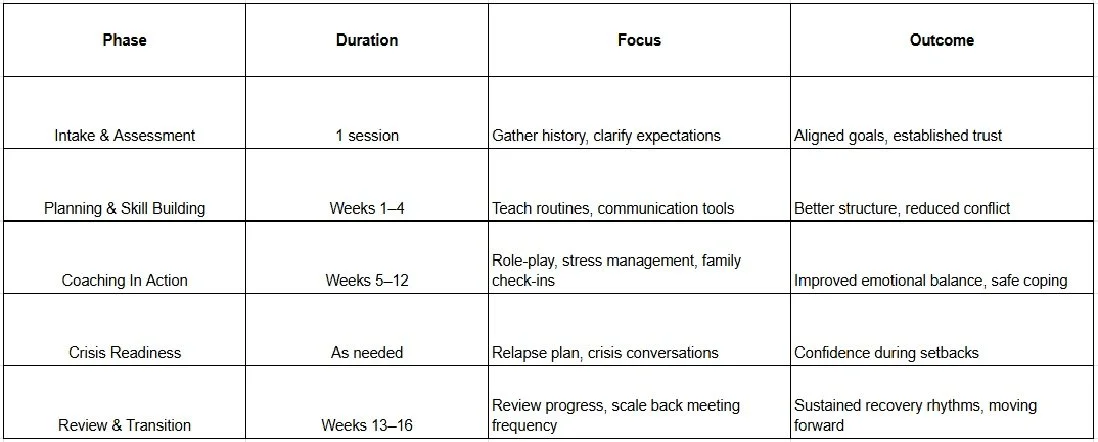How To Choose The Right Recovery Coach For Families
When a family begins the recovery process, everyone feels it. Every family member is impacted by the shifts, the setbacks, and the small wins. So when we're asked how to choose the right recovery coach, we always say this: you’re looking for someone who can support the whole family, not just the person struggling with their mental health or addiction.
A good recovery coach brings structure, calm, and a clear plan. They support each person while keeping the family connected. That kind of support can change the direction of recovery. Here’s what to look for and what to expect when choosing a recovery coach for your family.
Understanding Recovery Coaching in a Family Context
Families face unique dynamics when addiction, mental health issues, or disaster touch their lives. A recovery coach works with the whole family in creating a supportive environment for healing.
A recovery coach supports the entire household by:
Helping each person set realistic, personal goals
Teaching everyday tools that work with your routines and values
Encouraging healthy communication so conversations feel safer
Helping reduce chaos and create more consistency at home
Rather than focusing only on one person’s behavior, a coach helps everyone make adjustments that support healing. It’s hands-on and practical, with a focus on lasting change.
What Does a Recovery Coach Do for Families?
When you wonder “what does a recovery coach do?”, especially in a family setting, here’s what they deliver:
Clarifying Goals Together
Working with you, they define clear and shared recovery goals, whether that’s supporting a loved one’s sobriety, rebuilding relationships, or ensuring healthy routines for children.Skill Building in Daily Life
They teach skills like healthy communication, managing stress, establishing boundaries, and supporting one another without overstepping or enabling.Crisis Support and Relapse Prevention
When setbacks happen, a coach helps families identify early signs of relapse, plan safe interventions, and hold space for healing instead of blame.Navigating Outside Resources
They connect families to therapy, peer groups, 12‑step programs, or legal and social services as needed.Ongoing Check‑Ins and Accountability
Regular sessions provide support, celebrate milestones, and course-correct along the way.
Because so many family dynamics are interwoven, the coaching is practical, direct, and rooted in everyday life, with no jargon, just realistic tools and encouragement.
Why Families Often Need Recovery Coaches
Recovery coaches don’t replace therapists or physicians. Instead, they fill critical gaps:
Bridging clinical care and daily life: They help translate therapy talk into practical, real-world actions that families can follow.
Maintaining post-treatment support: After rehab or detox, many families feel stranded. Coaches keep the momentum going.
Reducing stress and conflict: Coaches offer tools so tough conversations don’t erode relationships.
Support for the supporters: Family caregivers often feel overwhelmed or burned out. A good coach also helps them find balance and self-care.
Encouraging long-term change: Family healing takes time. Coaches bring structure and sustained engagement.
Research also backs this up. In “The Help Families Need to Overcome Substance Dependence” (Imprint News), Stacy Phillips explains that addiction fractures entire households and that traditional treatment often overlooks family needs. Studies cited in her article show that family-centered peer recovery coaching significantly improves cohesion and stability, while also reducing relapse and future substance use episodes. By supporting families instead of dismantling them during vulnerable times, recovery coaches create conditions for genuine resilience and long-term healing.
Qualities to Look for in a Family Recovery Coach
Choosing a recovery coach for families means more than just hiring someone who’s certified. Here are traits to consider:
Lived Experience or Empathy
A coach who’s personally experienced recovery (or has supported families through it) brings practical empathy. They stay grounded in real-life challenges, like work, parenting, and boundaries.
Structured Approach with Flexibility
Look for someone who offers a clear process (goal setting, check-in schedule, relapse planning), yet adjusts to your changing family needs.
Family Systems Knowledge
A coach should understand family roles, intergenerational trauma, and how stress flows through a household. They should help each member speak up, share feelings, and contribute to recovery.
Communication Skills
Patience and active listening matter more than fancy credentials. A great coach asks questions that help each family member feel heard and understood.
Professional Training and Ethics
Find someone with credentials from a recognized recovery coaching organization (e.g. ICF, RCCA). Ask about confidentiality, liability insurance, boundaries, and professional ethics.
Steps to Finding the Right Coach for Your Family
Ready to choose someone you can rely on? Follow these practical steps:
Step 1 – Identify Goals as a Family
As a group, list what you want: stronger communication, smoother transitions for school or work, substance-free social events, or rebuilding trust after crisis. That helps you match a coach who has experience with those same areas.
Step 2 – Research and Ask Around
Look at local listings or trusted referral sites.
Ask therapists, recovery support groups, pediatricians, or spiritual leaders if they recommend anyone.
Look for reviews or testimonials that mention family work, conflict resolution, or long-term follow-up.
Step 3 – Interview at Least Two Coaches
Notice how it feels to talk to them. Do they listen? Do they show flexibility? Do they explain practical expectations clearly? Here are some questions to ask to get the conversation started:
“What does a recovery coach do in a family context?”
“How much experience do you have working with families?”
“How often do you meet, and what does a typical session look like?”
“How do you handle relapses or conflict between family members?”
“How do you keep communication safe and respectful?”
Step 4 – Check Credentials and Approach
Ask:
Do they hold certification or training specific to recovery coaching?
Do they carry insurance and follow ethical guidelines?
Do they offer trial sessions to see how they fit with your family?
What backup services do they refer to (therapy, support groups, medical care)?
Step 5 – Test a Trial Period
If possible, commit to a short trial (4‑6 sessions) to evaluate:
Are conflicts decreasing?
Is trust growing?
Do family members feel more heard?
Are your shared goals advancing?
After the trial, reassess: change coaches if the fit isn’t right. This match matters.
What Families Should Expect During Coaching
Intake and Assessment
The coach meets the full family (or smaller group if needed), reviews history, strengths, and challenges. They set clear expectations and confidentiality boundaries.
Goal Planning
Together, plan realistic goals, like weekly check-ins, family mealtime without devices, or private time for parent self-care.
Regular Family Sessions
Weekly or biweekly check-ins allow the coach to guide role-play, help practice new habits, and reinforce accountability.
Individual Support
Coaching often includes time with individual members (teens, parents, siblings) to address emotions or barriers privately.
Crisis Response
If a relapse occurs, the coach helps the family respond calmly: isolate the moment, reassure safety, review prevention tools, and reconnect.
Celebration and Adjustment
Coaches celebrate progress and adjust plans as goals evolve. They help families build rituals, like monthly reflection dinners or gratitude practices, that reinforce recovery.
Common Mistakes to Avoid When Choosing a Coach
Skipping interviews. Don’t hire based on ads alone. A coach’s personality and style matter.
Ignoring family input. Each member should have a say in the fit.
Assuming experience means fit. A coach familiar with adult recovery may not know how to support teens or elders.
Overlooking cost vs value. Cheap isn’t always better. Quality guidance can save emotional strain and relapse costs.
Failing to revisit choices. If things aren’t moving forward after a few sessions, consider a change.
How Working Together Can Make Recovery Stick
Recovery isn’t something one person does alone. The whole family has to work together to reshape their everyday life. A recovery coach helps bring this to reality:
Improved communication: Clearing assumptions, easing tension, and listening better.
Stable routines: Mealtimes, device‑free hours, self-care for caregivers.
Shared goals: Planning sober celebrations, therapy check-ins, support group schedules.
Accountable structure: Knowing each member plays a role in follow-up and reminders.
Mutual respect: Teaching conflict resolution without blame or shame.
H2: Sample Coaching Timeline for a Family
This is just one example. A coach adapts to each family’s pace. Some move faster, and others progress more slowly.
Supporting You in Recovery, Every Step of the Way
The right recovery coach can help your family:
Stay connected and work through pain without shame.
Balance individual needs and group goals.
Learn tools you can use long after coaching ends.
Respond gracefully to setbacks instead of reacting in panic.
Celebrate milestones, big and small.
When you choose a recovery coach, you're inviting someone into your family journey to be a guide to help the whole household heal, grow, and thrive.
Trust the process, trust the fit, and give yourself space to adjust if needed. Reach out, interview, and find the coach who brings hope, structure, and heart.
Ready to take the next step?
Reach out to Bridge the Gap Services to schedule your free consultation and discover how a recovery coach can guide your family toward stronger bonds and a healthier future. Contact us today and take that first step together!



